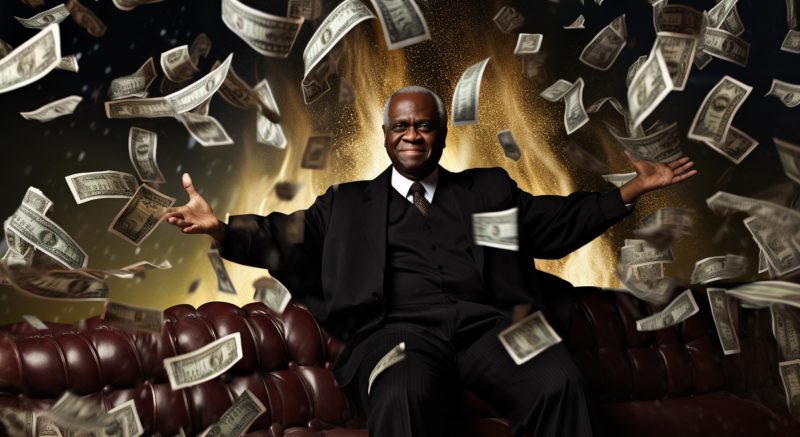
The recent revelations regarding Supreme Court Justice Clarence Thomas’s acceptance of lavish gifts and vacations have sparked a significant debate and controversy surrounding ethical conduct, disclosure, and public trust in the judicial system.
Justice Thomas must resign.
Justice Clarence Thomas’s Acceptance of Gifts and Vacations
Supreme Court Justice Clarence Thomas has been embroiled in a recent scandal involving the acceptance of unprecedented gifts from affluent connections such as H. Wayne Huizenga, David Sokol, Paul “Tony” Novelly, and notably, major GOP donor Harlan Crow. The gifts include 38 vacations, 26 private jet flights, eight helicopter flights, VIP sport event passes, and access to an exclusive golf club. Here is a ummary of what he accepted in undisclosed gifts from 4 billionaires:
38+ destination vacations, 26 private jet flights, 8 by helicopter, 12 VIP passes to professional & college sporting events, 2 stays at luxury resorts in Florida & Jamaica, and that’s just what we now know about and on top of the gifts that were revealed before in this report.
Ethics Violations
The controversy focuses on potential violations of disclosure rules for gifts exceeding $415 and ethics regulations concerning fundraising. It highlights concerns over transparency and public trust. The extent and frequency of these gifts, especially the undisclosed luxury trips from Harlan Crow, raise serious ethical concerns and challenge the integrity of the justice system.
Political Dimensions of the Controversy
Democrats are pushing for stricter ethics reforms within the Supreme Court, with opposition from Republican lawmakers. This adds a significant political dimension to the debate, highlighting the broader implications for the judiciary’s relationship with politics.
Defensive Statements and Public Perception
Justice Thomas defended these relationships, claiming he was informed that disclosure was unnecessary. Some of Thomas’s associates have also defended the interactions and criticized the media’s portrayal of the situation [1]. Despite these defenses, the lack of disclosure and the extravagant nature of the gifts have prompted debates on judicial integrity and even discussions of impeachment, especially from progressive voices.
Conclusion: A Challenge to Public Trust
The situation surrounding Justice Clarence Thomas underscores a glaring dilemma in judicial ethics and public trust. The acceptance of such opulent gifts and vacations, and the subsequent lack of transparency, have sown seeds of doubt in the integrity of a system that demands the highest ethical standards. The ongoing debate is likely to fuel conversations about ethics reform within the Supreme Court and the need for transparency, accountability, and adherence to principles that maintain public confidence in the judiciary. The divergence in political perspectives on the issue further exacerbates the situation, turning what should be a matter of ethical conduct into a battleground for political ideologies. It serves as a poignant reminder of the delicate balance between maintaining personal relationships and upholding the rigorous ethical standards expected of public figures.
Justice Thomas’s situation raises critical questions about the role of personal connections in the professional lives of public servants, and the appropriate mechanisms to ensure that these relationships do not undermine the integrity and public trust in governmental institutions. It’s a controversy that undoubtedly warrants further scrutiny and action, and a reflection on the very values that define the justice system in a democratic society.
Justice Thomas must resign or be impeached.
